After being called for five personal fouls in its season-opening loss, the Texas Tech football team showed no improvement in an area that has been problematic during the Kliff Kingsbury era.
The Texas Tech football team has been criticized for a number of flaws during the Kliff Kingsbury era. One of the biggest and most persistent complaints has been the program’s constant struggle with penalties.
Unfortunately, that issue was again prevalent in the 2018 season opener last week as Tech was flagged six times for 80 yards.
Both totals were in line with what Tech averaged in 2017 when the Red Raiders were flagged on average 8.0 times per game for 76.6 yards. Out of 130 teams in the nation, Texas Tech was No. 127 in penalty yards assessed per game, worst in the Big 12.
Perhaps the most frustrating aspect of the team’s penalty problem is the prevalence of personal fouls called against the Red Raiders. In week one, Texas Tech was flagged five times for personal fouls, something that happened far too often last season.
In twelve regular season games in 2017, the Red Raiders were called for 29 personal fouls (including unsportsmanlike conduct). That is an average of 2.41 personal fouls per game.
If Texas Tech would have cut their 2017 personal fouls in half last year, they would have ranked No. 87 in the nation with 58.1 penalty yards per game, an improvement of 40 spots. And there is no reason that the Red Raiders should not be able to drastically decrease these penalties because most personal fouls are all about playing with discipline and keeping one’s emotions in check.
For instance, consider the taunting penalty assessed to receiver Seth Collins in the 4th quarter of the Ole Miss game. There was no reason for Collins to be tuning an opponent in the end zone when his team is down 20 points.
The penalty took Tech from a 1st-and-goal at the Rebels’ two-yard-line all the way back to the 17-yard-line. On the drive, Tech would not score as they turned the ball over on downs.
More from Wreck'Em Red
- Texas Tech football: Red Raider fans need to know about these Mountaineers
- Texas Tech football: Red Raiders land first commit for class of 2025
- Texas Tech football: Why have the Red Raiders struggled on the road under McGuire?
- Texas Tech football: Why the Red Raiders can compete for a Big 12 title
- Texas Tech football: Plenty of questions remain as conference play arrives
Far too often, Texas Tech seems to be the team that hits a player out of bounds, is called for taunting or is flagged for targeting (which happened three times in week-one with one of those penalties being downgraded to a personal foul).
Many Texas Tech football fans lay the blame for these penalties at the feet of Kliff Kingsbury and it is easy to see why. Texas Tech’s average ranking in penalty yardage per game during Kingsbury’s five seasons in 113th overall.
Certainly, other factors come in to play, namely the fact that Texas Tech is annually one of the leaders in most plays run per game. Since there are more plays per game in an average Texas Tech game, there are more opportunities for penalties, including personal fouls. That increases even more when Tech faces another high-tempo team, as is often the case in the Big 12.
But, regardless of why these penalties are happening, they must be corrected. This year’s Texas Tech football team has a much smaller margin for error on offense because it seems to lack the type of overall speed and game-breaking ability that previous “Air Raid” offenses have had.
Teams that want to rely on the ground game, as Texas Tech would like to do in 2018, can ill afford penalties like these which are largely avoidable. A veteran team with juniors or seniors starting at 16 of the 22 positions on the field, this year’s version of the Red Raiders must be more disciplined and more intelligent than they showed in the season’s first week.
